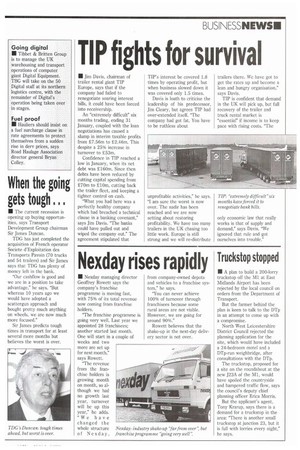TIP fights for survival
Page 15

If you've noticed an error in this article please click here to report it so we can fix it.
• Jim Davis, chairman of trailer rental giant TIP Europe, says that if the company had failed to renegotiate soaring interest bills, it could have been forced into receivership.
An "extremely difficult" six months trading, ending 31 January, coupled with the loan negotiations has caused a slump in interim taxable profits from £7.56m to £2.46m. This despite a 25% increase in turnover to g53m.
Confidence in TIP reached a low in January, when its net debt was £160m. Since then debts have been reduced by cutting capital spending from £70m to tl0m, cutting back the trailer fleet, and keeping a tighter control on cash.
"What you had here was a perfectly healthy company which had breached a technical clause in a banking covenant," says Jim Davis. "The banks could have pulled out and wiped the company out." The agreement stipulated that TIP's interest be covered 1.8 times by operating profit, but when business slowed down it was covered only 1.5 times.
Davis is loath to criticise the leadership of his predecessor, Jim Cleary, but agrees TIP had over-extended itself. "The company had got fat. You have to be ruthless about unprofitable activities," he says. "I am sure the worst is now over, The nadir has been reached and we are now setting about restoring profitability. We have too many trailers in the UK chasing too little work. Europe is still strong and we will re-distribute trailers there. We have got to get the rates up and become a lean and hungry organisation," says Davis.
TIP is confident that demand in the UK will pick up, but full recovery of the trailer and truck rental market is "essential" if income is to keep pace with rising costs. "The only economic law that really works is that of supply and demand," says Davis. "We ignored that rule and got ourselves into trouble."












































































